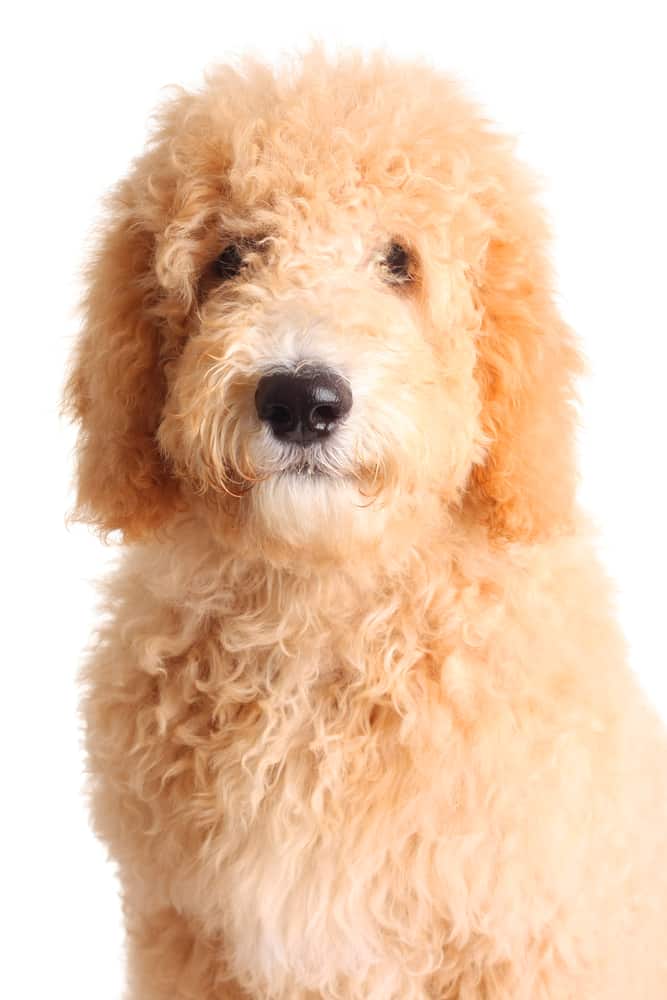Complete Guide To The Goldendoodle: Health, Grooming, Feeding and More
The Goldendoodle is a Golden Retriever-Poodle hybrid. Different from an incidental mixed breeding involving a sneaky neighbor dog, it’s a deliberate pairing intended to make the most of each breed’s best characteristics. With the intelligence of a Poodle and the affable temperament of a Golden Retriever, Goldendoodles are smart, affectionate and adaptable family companions.
Goldendoodles have exploded in popularity in my veterinary practice over the last 5 years and I’d say they are the most common “breed” that we see at this time. I have a lot of experience with this type of dog and the following is partly based on that.
Table of Contents
How Big Do Goldendoodles Get?
The way genes express themselves isn’t always predictable, but Goldendoodle puppies have a fairly consistent appearance. Weight varies based on whether the Poodle parent was miniature-, medium- or standard-sized, ranging from a low of 15 pounds for miniature females to over 100 pounds for standard males. Height ranges from 13–28 inches at the shoulder.

What Do Goldendoodles Look Like?
Colors may represent either parent and include:
• Cream
• Apricot
• Red
• Chocolate
• Black
Coats length varies from medium-short to long with a curly, wavy or shaggy texture. Eyes are typically dark, but other general characteristics from the length of the muzzle to the shape of the tail can favor either the Poodle or the Golden Retriever, but a happy medium is the most common. Goldendoodles are rarely mistaken for Golden Retrievers, but may often resemble the Poodle.
What Is The Personality Of A Goldendoodle?
Personality is among the primary purposes for breeding Goldendoodles. Patient, friendly and loyal, they’re ideal companions for families and responsive to training as service and therapy dogs.
Rarely aggressive, it’s more likely they’ll invite strangers to dinner than chase them away — don’t let them guard the silver. Their gentle nature makes them safe apartment dwellers and excellent first-time pets for children.
Goldendoodles need plenty of exercise but are willing to tag along on any activity from road runs to day hikes — as long as the family is together. Athletic, they’ll chase balls, catch frisbees and even swim.
These dogs are some of the most fun ones that I see in practice every day. While it can be uncommon to see a shy or insecure Doodle, make sure you’re socializing your puppy as much as possible when they’re young.
How Much Grooming Do Goldendoodles Need?
Grooming Goldendoodles isn’t for the faint of heart. It’s not complicated, but it requires commitment. They shed infrequently, a pleasant surprise for people with pet allergies, but their Poodle-like coats will quickly become unruly without regular attention.
Brushing every other day with a slicker is recommended — their curls are magnets for outdoor debris. And although they don’t shed much, their thick coats are prone to matting. Like Poodles, most Goldendoodles see a groomer every two to three months for a trim and bath.

Despite the hairy ears (not in every Doodle), Goldendoodles aren’t necessarily prone to ear infections. Their ear hair doesn’t need to be plucked unless they develop a ear infection and the hair has to be removed to treat the infection properly. Dogs with allergies and dogs that play in water are far more likely to develop ear infections.
Goldendoodles are usually active enough to keep their nails trim naturally, but hair on their feet can mask potential problems. Check them every two weeks and trim or file them as needed.
How Much Exercise Does A Goldendoodle Need?
While there are some calm Goldendoodles, expect yours to need a fair amount of exercise.
Activities That I Recommend With This Breed:
- Walking
- Hiking (both walking and hiking can be done with your dog also wearing a weighted pack; the weight in the pack will help to tire your dog out faster; don’t do this if your dog has any orthopedic issues)
- Swimming
- Agility Training
- Day Play to both exercise and have time to play with other dogs
- Dog Parks
What Kind of Dog Food Is Good For A Goldendoodle?
The Goldendoodle is a dog that doesn’t always care that much about foods. Some of this type of dog are chow hounds and lean towards obesity, but many of them are on the opposite end of the spectrum. They don’t care to eat as puppies or adults and their owners tear their hair out trying to get them to eat.
Another thing to mention is that grain-free dog foods are a myth. There’s zero science showing that they are helpful. In fact, there’s increasing evidence that it’s causing issues in certain breeds of dogs and one of those is the Golden Retriever.
To think that the Goldendoodle wouldn’t have issues with a grain-free diet fed long term is not practical. It just may take longer for the Doodle to develop heart disease. Food allergies are the only reason to even consider a grain-free diet but only choose one with the help of your veterinarian.
Best Puppy Food For Goldendoodles:
Best Adult Food For Goldendoodles:
With their long coat, it can difficult for an inexperienced owner to tell when their Goldendoodle is overweight. Ask your veterinarian to show you how you feel the ribs and back to determine if they’re too big/thin.
How Long Does A Goldendoodle Live?
10-15 years and this is based on my personal experience; My oldest Doodle patient just passed away at the age of 15
What Health Problems Can Goldendoodles Have?
Everybody and their brother are breeding Goldendoodles nowadays and these puppies are only as healthy as the parent dogs they come from. Dogs in my area may be more (or less) healthy than the ones in your area so my list below may not be completely accurate for where you live.
That being said, the most common health issues I see in this breed includes:
- Allergies/Atopy
- Hypothyroidism
- Hip Dysplasia/Arthritis
- Neoplasia (Lymphoma)
- Bloat
- Inflammatory Bowel Disease
Of course, any dog can develop obesity and dental disease so be mindful of that in your Doodle. Despite the fact that Allergies can occur in any breed of dog, I find that there’s a higher incidence of this in Goldendoodles than many of the other breeds that I see.
One caveat about Mini-Goldendoodles – the only one I’ve ever seen had Juvenile Diabetes before he was 6 months old and is the only case of this that I’ve ever seen. Consulting with a local Veterinary Internal Medicine specialist, I found out that this is Juvenile Diabetes is over-represented in this version of the breed.
Any time you’re taking a dog like the Golden and mixing it with a Poodle and then deliberately trying to make that dog smaller you’re going to run into genetic issues. You can start with a miniature poodle, but the Golden Retriever is still a very large dog. You’re purposefully breeding the smaller, runt-like dogs and these little ones may carry all sorts of health issues along with the smaller size.
Where Can I Find Out More About Goldendoodles?
Goldendoodle Association of North America
Where Can I Find a Goldendoodle?
Breeder List from the Goldendoodle Association of North America
You can always look for a local breeder, but I would ask around for references from that breeder. Try and talk with families that have obtained a Doodle from that breeder. How healthy has the dog been? Any big issues?
Interesting Facts About Goldendoodles
Did you know?
• Goldendoodles Aren’t New
Goldendoodles were first bred in 1969, but word of mouth has increased their popularity. They consistently rank among the top ten designer dogs, sharing honors with the Labradoodle and Peek-a-Poo.
• They’re a Dog by Many Names
If you’re searching for a Goldendoodle, it helps to know that they have other nicknames, including Groodles, Doodles and Goldenpoos.
• Goldendoodles Aren’t Recognized by the AKC
The AKC recognizes only purebred dogs to validate their pedigrees — registration does not reflect the quality of a dog. The Goldendoodle Association of America (GANA) offers a similar registration program that, like the AKC, requires two GANA-registered parents. The AKC has a Canine Partners program that gains mixed-breed registrants access to AKC agility events.
• They’re Not Hypoallergenic — But They’re Close
All dogs shed dander — microscopic skin cells responsible for allergies in humans. However, the more a dog sheds hair, the more likely dander is to be released in the environment, so low shedders, like Poodles, are closer to hypoallergenic than other breeds. Genetically, Goldendoodles are 50-50 bet.
• The Camera Loves Goldendoodles
No fewer than seven Goldendoodles have their own Instagram accounts with nearly half a million followers between them. Their tireless antics have earned them fans across the country. Tune in to see Kevin as he travels through the Windy City or check out Gouda’s celebrity-worthy clothes closet.
• First-Generation Hybrids Have the Most Predictable Characteristics
Goldendoodles are the result of different breeding approaches, and select traits can be foreseen by knowing more about puppies’ lineage as described by genetic labels. An F1, or first-generation, Goldendoodle, has Golden Retriever and Poodle parents. An F2 is the product of two first-generation Goldendoodles and may have less predictable qualities.
• Goldendoodles Are Healthy Hybrids
Mixed breeds dogs tend to have fewer genetic abnormalities or tendencies toward illness than pure breeds because faulty genetic material is diluted. Know as hybrid vigor, it’s a fact noted more than 50 times by naturalist Charles Darwin in his revolutionary work, On the Origin of the Species.
• Designer Dogs for Designer People
Celebrities love one-of-a-kind outfits that make them stand out in a crowd, so why wouldn’t they want designer dogs, too? Famous Goldendoodle fans include television personality Paula Deen, country star Kenny Chesney, pop musician Usher and golf champion Tiger Woods.
